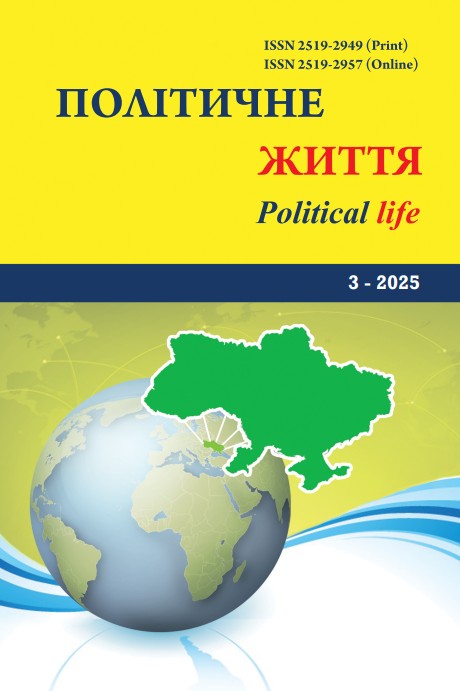Ключові категорії дослідження безпеки у політологічному вимірі
DOI:
https://doi.org/10.31558/2519-2949.2025.3.3Ключові слова:
безпека, загроза, небезпека, конфлікт, світоустрій, універсалізмАнотація
У статті окреслено основні категорії дослідження питань безпеки в межах політологічної науки. Автором проаналізовано сутність ключових понять, таких як безпека, загроза, небезпека та конфлікт, які слугують фундаментом для формування цілісної архітектури безпеки. У найбільш конкретному визначенні безпека розглядається як збереження норм, правил, інститутів і цінностей суспільства. У запропонованій автором класифікації безпеки особливу увагу приділено взаємодоповнюваності та взаємозв’язку різних її типів. Також у статті розглянуто сутність і класифікацію категорії «загроза», яку визначено як об’єктивно існуючу можливість завдати шкоди особистості, суспільству чи державі. Автором зазначено, що найбільш універсальним вважається поділ загроз за характером впливу на реальні, вигадані та можливі; за напрямком впливу на зовнішні та внутрішні; за масштабами впливу на глобальні, регіональні та локальні; за сферами впливу на соціальні, військові, політичні, екологічні та інформаційні; за ступенем впливу на стратегічні та тактичні. З’ясовано, що поняття «небезпека» означає об’єктивно існуючу можливість негативного впливу на соціум, що призводить до шкоди національним інтересам і безпеці держави. Наголошено на важливості виокремлення джерел, умов і чинників, які сприяють виникненню небезпеки. Автором підкреслено тісний взаємозв’язок між цими трьома категоріями та проблематикою конфліктів, які залишаються основним фактором дестабілізації безпекового середовища. Зазначено взаємовплив цих категорій на сучасні світові політичні процеси. У висновках статті стверджується, що для опису особливостей системи світоустрою та глобальної безпекової ситуації доцільно застосовувати теорії стабільності, серед яких найбільш поширеними є теорія балансу сил і теорія стримування. Виокремлено умови, що впливають на міжнародний баланс сил. Зазначено випадки, коли стримування загрозам не приносить необхідних результатів. Автором акцентовано увагу на тому, що пріоритетом у забезпеченні глобальної безпеки має залишатися недопущення конфліктів або мінімізація їхніх негативних наслідків.
Посилання
Aristotel. (2000). Polityka [Policy]. Kyiv: Osnovy.
Platon, (2000). Derzhava [State]. Kyiv: Osnovy.
Russo, Zh.-Zh. (2001). Pro suspilnu uhodu, abo pryntsypy politychnoho prava [On the social contract, or the principles of political law]. Kyiv: Osnovy.
Rothschild, E. (1995). What Is Security? Daedalus, 124(3), 53-98. URL: http://www.jstor.org/stable/20027310
Sytnyk, H.P., Oluiko, V.M. & Vavrynchuk, M.P. (2007). Natsionalna bezpeka Ukrainy: teoriia i praktyka [National Security of Ukraine: Theory and Practice]. Kyiv: Kondor.
Zaplatynskyi, V.M., (2012). Lohiko-determinantni pidkhody do rozuminnia poniattia «Bezpeka» [Logical-deterministic approaches to understanding the concept of «Security»]. Visnyk Kamianets-Podilskoho natsionalnoho universytetu imeni Ivana Ohiienka. Fizychne vykhovannia, sport i zdorovia liudyny [Bulletin of the Ivan Ohienko Kamianets-Podilskyi National University. Physical education, sports and human health]. URL: http://visnyk-sport.kpnu.edu.ua/article/view/29969/26697
Makinda, S. M. (1998). Sovereignty and Global Security. Security Dialogue, 29(3), 281-292.
Lavrynenko, H., & Donaj, Ł. (2023). Unification of Ukrainian society in a postwar period as a preventive mechanism to avert the crisis of state. Przegląd Strategiczny, 16, 321-331.
Osisanya, S. (2014). National Security versus Global Security. URL: https://www.un.org/en/chronicle/article/national-security-versus-global-security
Stunner, M. (1989). Die Deutschen in Europa. Europa Archiv, 24.
Pocheptsov, H.H. (2004). Stratehichnyi analiz [Strategic analysis]. Kharkiv: Dzvin.
Sytnyk, H.P. & Orel, M.H. (eds.) (2021). Natsionalna bezpeka v konteksti yevropeiskoi intehratsii Ukrainy [National security in the context of Ukraine's European integration]. Kyiv: Mizhrehionalna Akademiia upravlinnia personalom.
Prymush, M.V. (2006). Konfliktolohiia [Conflictology]. Kyiv: VD “Profesional”.
Lavrynenko, H. (2023). Konstruktyvne rozviazannia konfliktiv: formy, stratehii i sposoby vyrishennia [Constructive Conflict Resolution: Forms, Strategies, and Methods of Resolution]. Politychne zhyttia, 1, 15–23.

